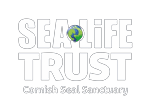![]()
The Sanctuary has some helpful tips on what to do if you come across a seal pup on the beach;
1. Do keep your distance
If a pup has a fluffy white coat, it still needs its mother. She will have spotted you long before you saw her and she will hopefully be watching from a safe distance out at sea. A mum will only return to feed her pup if she thinks it is safe to do so.
2. Don’t touch the pup
It is a wild animal with sharp teeth. A mother may reject her pup if it smells of people, so keep downwind and
out of sight.
3. Don’t put any seal back in the sea
A white coated pup spends most time out of water. All seals haul out onto land to rest, digest and socialise all
year round.
4. Do take a good look from distance
If the pup is alone, thin, injured or seems unwell (noisy breathing, coughing, runny nose) it may need help.
5. Do something about it
Telephone Cornish Seal Sanctuary for expert advice on 01326221 361 or British Divers Marine Life Rescue on 01825 765 546 giving an accurate location.
The Cornish Seal Sanctuary is part of the SEALIFE Trust charity and couldn’t do their vital work without the support of the public.
Seal pups cost on average £2,000 to go through rehabilitation – and this doesn’t include those that require special care, such as Ted who came to the sanctuary with a broken jaw and needed surgery or Harry who was so entangled in netting his wounds were life threatening.
The Sanctuary are very grateful for all their guests and donations received that help with the costs of pup rehabilitation and medical care for the resident animals.

